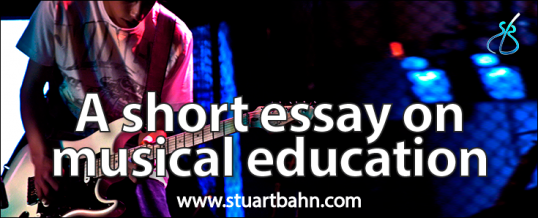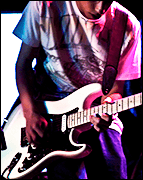
To learn or not to learn…
Around the time when I first decided to study music, I was introduced to an aspiring guitarist by a friend.
We started chatting about who inspired us, and who we were listening to at that time. We shared similar tastes in music and it was a nice conversation – right up to the point when I mentioned that I planned to study music full time in London.
‘Why would you want to do that?’ he asked disapprovingly, followed by ‘That’s not something I would ever do’. Not the reaction I was expecting.
 As the conversation progressed, it became clear that he felt this way, not for any sensible reasons such as the time and money I would have to invest in my venture. Instead it was that he believed ‘learning’ guitar was a bad thing and should be avoided. He had strong opinions about this.
As the conversation progressed, it became clear that he felt this way, not for any sensible reasons such as the time and money I would have to invest in my venture. Instead it was that he believed ‘learning’ guitar was a bad thing and should be avoided. He had strong opinions about this.
He believed that taking lessons was somehow cheating. He believed that even the best contemporary music colleges (such as the one I was going to) churn out guitarists that all sound the same. He also believed that studying music would somehow destroy some kind of musical magic from within.
A reflection
From time to time we all come across views like this, whether it’s about music, writing, or any other artistic fields. If I’m honest, in my teens when I first started to learn the guitar, I used to think I was better off discovering everything by myself rather than taking structured lessons – not that there was much choice in the tiny rural village I grew up in.
Why did I change my view then? Well, quite simply, as I got older I realised that time is precious, and the biggest problem with trying to discover everything by yourself is that it just takes too long. We only have one lifetime in which to achieve our goals and to enjoy the fruits of our labour.
A question of time
 Considering the time available then, how can it be a good thing to spend four months ‘discovering’ something basic that an educated mentor could teach you in an hour?
Considering the time available then, how can it be a good thing to spend four months ‘discovering’ something basic that an educated mentor could teach you in an hour?
That lesson would then allow you to spend four months mastering, using and building on your newfound knowledge. This isn’t cheating; it’s using your head and making good use of limited time. Imagine what else you could achieve in the 4 months you just saved.
As for a loss of inner magic, well if it takes a person four months to discover and learn something relatively simple, then they’re going to need nothing short of a miracle to compete with the legions of guitarists out there that have had a comprehensive musical education.
Could you do everything by yourself?
In theory you could learn everything you need to know by locking yourself in your room; stopping only to perform the necessary bodily functions, but the odds are stacked against you.
With no guidance or feedback it’s highly unlikely that you will be able to compete with your contemporaries who are busy efficiently learning, receiving expert advice from world-class tutors and learning music theory.
On top of that, music is not something that should take place in isolation. You need to get out there and meet other musicians.
Getting out of your bedroom will give you the chance to build networks, to exchange ideas with fellow musicians, to jam, to get involved in projects, to be inspired by people who may be more advanced than you in certain areas. The importance of all of these things in the life of a musician really cannot be underestimated.
Embrace learning
 The idea of protecting one’s inner magic is really just protecting one’s naivety. For some it might be appealing to stay away from serious musical education to allow them to continue believing that they are a great undiscovered talent, but ultimately this isn’t fulfilling.
The idea of protecting one’s inner magic is really just protecting one’s naivety. For some it might be appealing to stay away from serious musical education to allow them to continue believing that they are a great undiscovered talent, but ultimately this isn’t fulfilling.
I’ve taught hundreds of guitarists and one of the most rewarding experiences is to completely turn things around for someone who has been struggling on their own for years – something I went through myself.
By opening themselves up to musical education they are allowing themselves to end the frustration of constantly hitting a brick wall with their playing.
Technique issues can finally be fixed, technical understanding can be developed and musical vocabulary dramatically expanded. Their sense of relief is often as clear to see as the reigniting of their enthusiasm for music.
In conclusion
Sometimes I recall that conversation with the aspiring guitarist I met and wonder if he held onto his beliefs and how he got on. Does he even play guitar these days? Maybe I’ll look him up one day and find out.
We are all talented in different ways. Speaking personally though, I would never have come anywhere near where I have (so far) without the musical education that I’ve had. I’ve benefited enormously from the guiding hands of each of the excellent teachers I’ve been fortunate enough to learn from over the years.
Whatever your interests and aspirations, your natural talents are just the starting point (for more on this see my article ‘There’s nothing natural about playing the guitar‘.
You need help to nurture and develop your natural talents. Few, if any, can do this alone. Embrace education and learn from others who have already made the journey (and the mistakes).
As the poet and writer Paul Hyland put it, ‘Why wander in a desert wilfully avoiding the oases, filtering your own urine because it tastes so, so good?’.
If you liked this essay on musical education please share it with others.
photo credit: miquelferrandiz via photopin cc
photo credit: purplemattfish via photopin cc
photo credit: striatic via photopin cc
FEB
2014

About the Author:
Stuart Bahn is a professional guitarist and guitar educator in London, England.